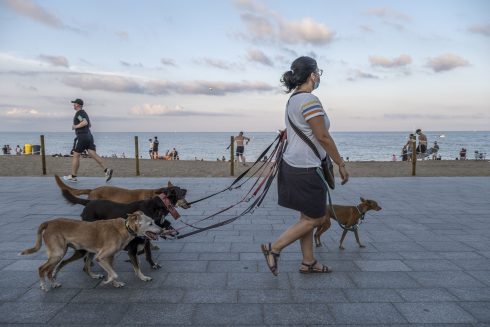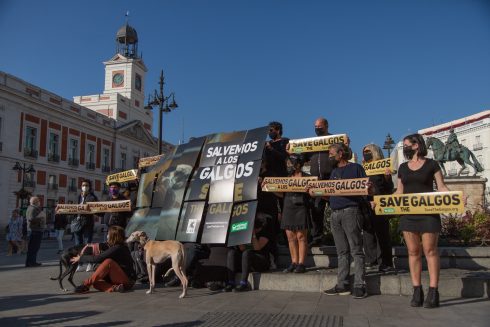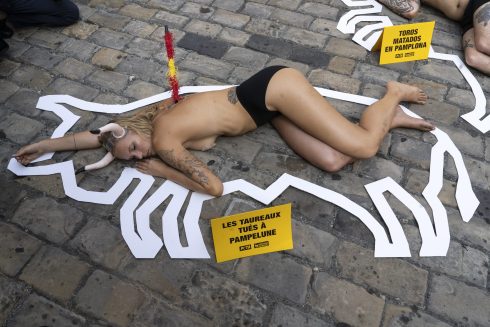THE fate of animals in Spain as “things or property” as opposed to “sensitive beings,” may finally change as politicians give a tentative green light to the draft of a new law on protecting animals from a range of abuses.
But the proposals have not proved dissension-free, with the ultra-right Vox party voting against, the conservative Popular Party abstaining and PACMA, Spain’s main animal rights organisation stating that they do not go far enough.
Vox MP for Guadalajara and former president of the Royal Spanish Hunting Federation, Alvaro Lopez Maraver took the stage in Congress to rail against ‘opening the gates to the religious worship of animals; one of the most modern and cruellest ideologies that condemns the animal to lose its instincts and places man on the edge of the abyss’.
The law, he said, promotes ‘idiocy and nonsense and the need to humanise animals while dehumanising man’.
The Royal Spanish Hunting Federation from which Lopez sprung takes a similar view. “What about a rat? Or a cockroach? Do they have rights now?” the federation’s director, Juan Herrera asks The Olive Press. “If these creatures are badly treated, do we call the people involved in animal protection or do they not count because they’re ugly? Where do you draw the line?

“In the countryside we look after our animals,” he adds. “This is a law made for cities. Limiting the number of dogs one person can own or making it compulsory to sterilise hunting dogs is not practical in rural areas. In fact, sterilisation is an abuse.”
But Cristina Garcia, PACMA’s vice president takes issue with this stance, telling the Olive Press, “The stricter the rules the better. Many hunting dogs are subjected to a living hell, are bred relentlessly, imprisoned in tiny cages and put down when they’re no longer of use. There’s no control.”

It should be pointed out that the draft of the new law is extensive and does threaten to take the issue from the sublime to the ridiculous. Hunting concerns aside, it prescribes the need for dog owners to undertake a course to prove they are fit for the job; not something a parent has to do before having a child.
Asked if this is not slightly over the top, PACMA’s vice-president says, “It’s a good idea, but not very practical and it could put people off adopting a pet.”
There is also the case of a custody battle, when the pet’s care will be decided by the judge, in the absence of an agreement between the warring parties. On this score, Garcia is in full agreement: “This is in line with the EU’s ruling. The pet should be treated as a member of the family rather than as a piece of property to be divided like the car,” she says.
In the long list of proposals, there are many other sane and crucial dictates, such as banning the putting down of a pet simply because it suits the owner, banning the use and sacrifice of animals in spectacles and fiestas, mutilations, imprisonment and basically any other form of abuse including their consumption or abandonment – Spain abandons 200,000 pets a year.
The glaring omission in the list of prohibitions, however, is bullfighting, which was declared a national heritage in 2016 and appears untouchable in whatever form it takes, though PACMA believes it is simply a case of taking the bull by the horns, as it were: “The government has the tools to retract its status as a national heritage; it just needs the courage to do so,” says Garcia.
The bullfight is, of course, embedded in Spanish culture, having been introduced as early as 711 AD to amuse King Alfonso VIII; Catalonia banned it in 2010, only to have the ruling overturned in 2016; and the one monarch previously brave enough to try to do away with it was King Carlos IV who outlawed it in 1805, making so many enemies, the tradition was reinstated three years later.
Spain has long had an odd relationship with its four-legged friends. While the fighting bull has been the main target, other animals have not escaped the attention of those organising fiestas in villages and towns across the country, which have, until very recently, often revolved around a piece of animal cruelty disguised as tradition.
In Manganeses de la Polvorosa, in Zamora, for example, a live goat was tossed from the town’s belfry until 2002; in Cazalilla, Jaen, this tradition endures, but with a live turkey substituting the goat. A feature of the fiestas in the town of Carpio del Tajo in Toledo, consisted until recently of hanging live geese upside down from a washing line, only to have their heads pulled off by a local on horseback; now at least the geese are killed beforehand. Until 2017, in Ceutí in Murcia, pigs were slathered in oil as part of a bestial game of chase. And in Cieza, Murcia, quails were fired from a canon in 2015.
In 2017, animal rights organisations estimated that 60,000 animals suffered abuse in Spain’s fiestas each year, though, according to PACMA, this figure is falling. “Neanderthals didn’t use animals this sadistically,” says Garcia. “But I prefer to think there’s now only a few people in favour.”

Certainly, many of the more unsavoury traditions have been stamped out, except for those involving the hapless fighting bull who continues to have burning torches attached to his horns in Medinaceli in Soria and barbs thrown at him in Coria, Caceres until, resembling a dart board, he is put out of his misery with a single shot.
The question seems to be, should these animals have rights or is it that owners or those responsible for them should simply have a duty of care? Alvaro Lopez is adamant that beings that are unable to assume responsibilities should not have rights while the hunting federation’s director Herrera jokes that next thing hunters will be pressed into giving their dogs holidays.
But, as Together for Catalonia MP, Pilar Calvo, points out, if you took this argument to its logical conclusion, then “disabled children shouldn’t have rights because they can’t assume responsibilities.”
Herrera, of course, slams such reasoning, saying that this is simply another example of humanising animals.
Hitler was big on animal rights, as is the ageing French actress and ultra-right flag-bearer, Brigitte Bardot. But animals in Spain would do better to nail their colours to the socialist mast and cross their paws that these potential gains aren’t thrown to the wolves before becoming enshrined in law.
READ ALSO:
